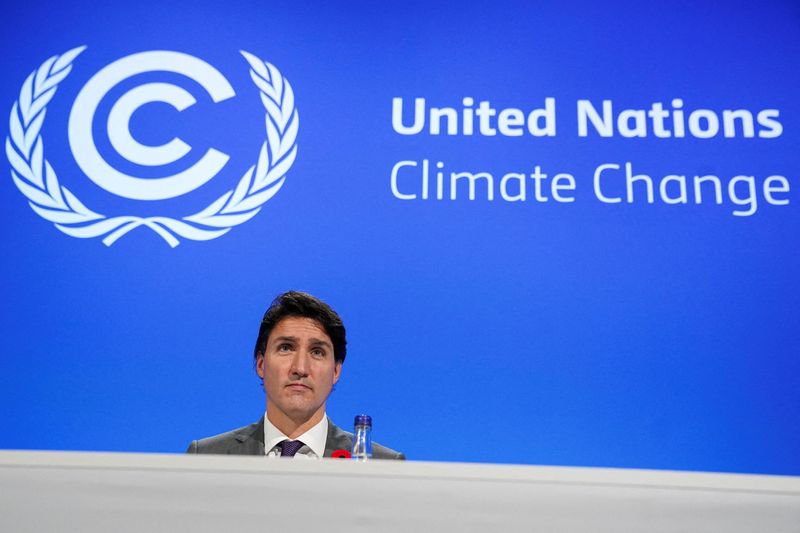By Julie Gordon
OTTAWA (Reuters) - Solar-powered homes, electric tractors and hydrogen-cell trucking fleets: Canada has big net-zero ambitions, but getting there will require trillions of dollars in investment and will likely fuel hotter inflation for years to come, economists said.
Over the last decade, Canadian business investment has sagged, running well below historic levels and leading to excess supply in the economy, which pushed down inflation and allowed for structurally lower interest rates.
But that trend is set to reverse, said David Dodge, an economist and former Bank of Canada governor, as spending ramps up during the so-called green transition.
"We have major investment efforts to deal with climate change and to convert everywhere from the use of fossil fuel," Dodge said in an interview with Reuters.
This spending will lead to a "tendency for prices to have some upward pressure rather than some downward pressure" starting as soon as next year, said Dodge, who headed Canada's central bank from 2001 to 2008.
Economists around the world already are warning of greenflation, higher energy prices and consumer costs as the global economy shifts to cleaner energy sources. Stronger business investment, demand for skilled higher-wage workers, and more innovation spending will also fuel price increases.
But hotter inflation will lead to higher interest rates, a worrisome risk for Canada's highly-indebted households, which are weighed down by C$2.5 trillion ($2 trillion) in debt, more than the country's annual output.
Canadian inflation is at an 18-year high of 4.7%, while the Bank of Canada's key interest rate has been at a record low of 0.25% since March 2020. The central bank has signaled it could hike as soon as April, but money markets are not ruling out an increase as soon as this month.
HUGE BILL
Canada, the world's fourth-largest oil producer, has pledged to reduce emissions 40%-45% below 2005 levels by 2030 and committed to achieving net-zero emissions by 2050.
The Royal Bank of Canada says getting to the net-zero target will cost C$2 trillion over three decades. Ian Lee, a professor in the Sprott School of Business at Carleton University in Ottawa, thinks it could cost more, pointing to the sheer prevalence of natural gas as a heating and industrial fuel.
"We're talking about rebuilding the entire energy-based economy, from oil and gas to electric, and so it's going to be at a scale never before experienced," Lee said.
"I have no doubt it will be inflationary," Lee added. "You do anything at that scale, and it's going to be inflationary."
Roughly 54% of Canadian homes are heated with fossil fuels, mostly natural gas, with 40% of them using electric heat, according to official data. Fossil fuels - mostly natural gas and coal - are used to generate 18% of Canada's electricity.
Homes, schools, businesses and industrial complexes will need to run on renewable electricity rather than gas. Cars, trucks, farm equipment and entire transport and industrial vehicle fleets will need to make the shift to electric.
Heightened demand for electricity will also require a major expansion of the power grid.
But some economists argue it is not clear the inflation bump will be persistent, pointing to how rapidly energy costs can fall once renewables are in place.
"Germany came in and basically subsidized everyone to put solar panels on their roof. That had a large negative impact on inflation because, obviously, it brought down power prices," said Stephen Brown, senior Canada economist at Capital Economics.
Ultimately, the climate-related restructuring may in the short term feel "hard to swallow," Bank of Canada Deputy Governor Toni Gravelle said during a panel at the COP26 climate change conference in November.

"But in the long term, you have actually a lot more jobs, you have an economy that's much more flexible ... It's a win-win at the end of the day," he said.
($1 = 1.2457 Canadian dollars)